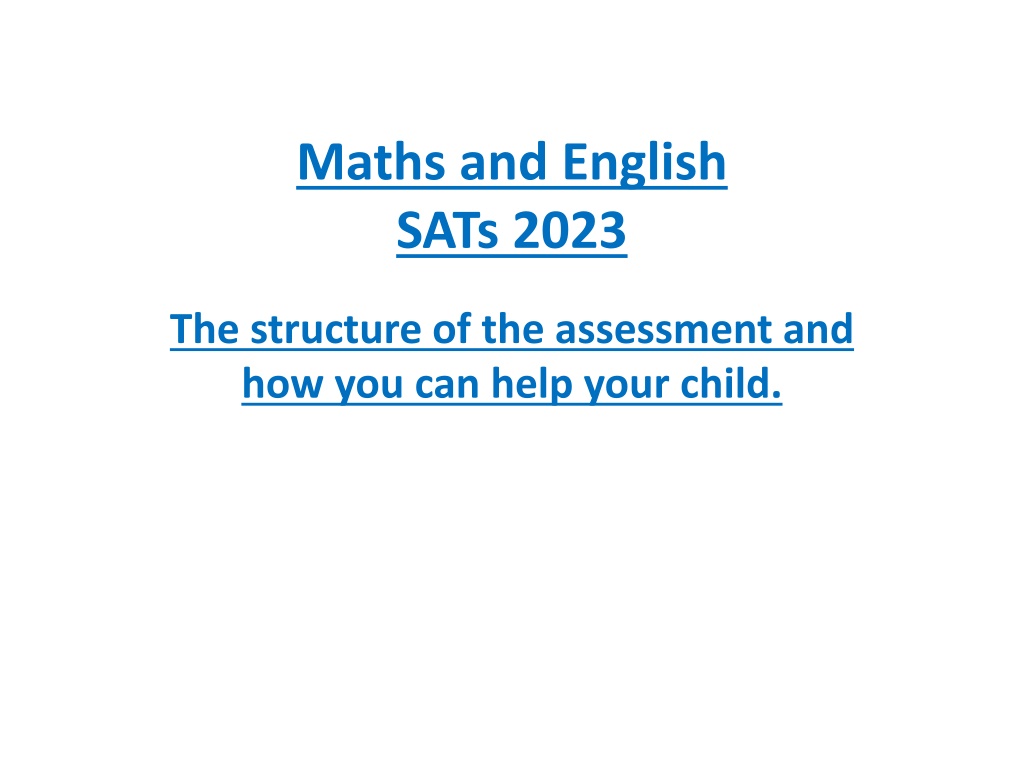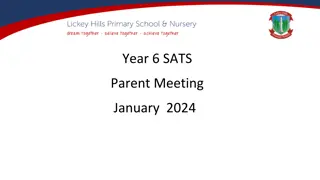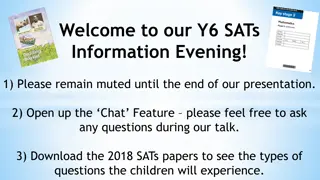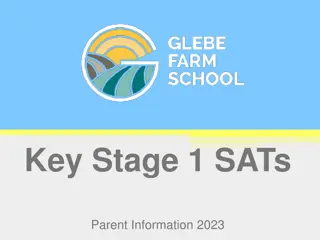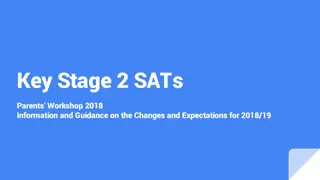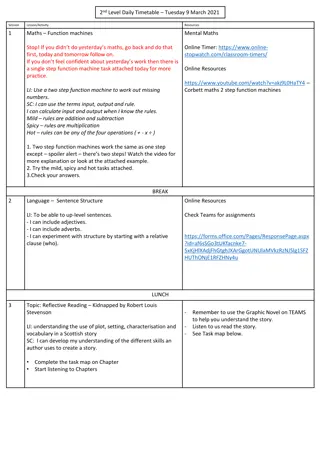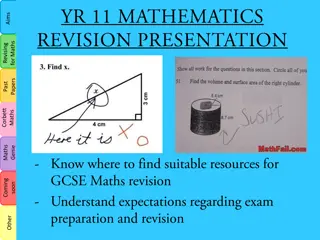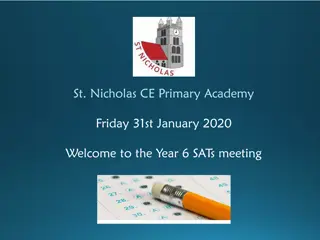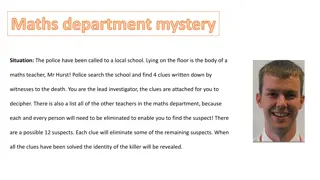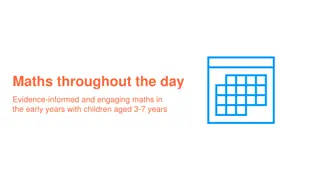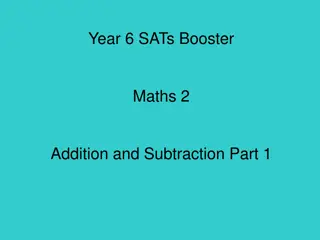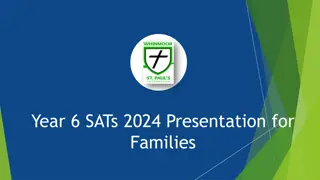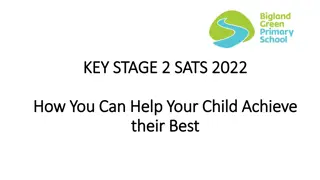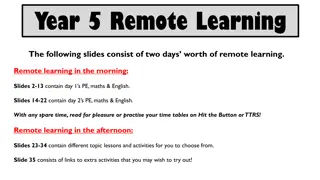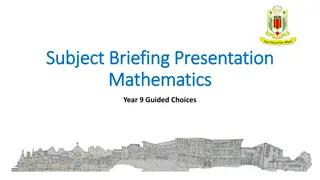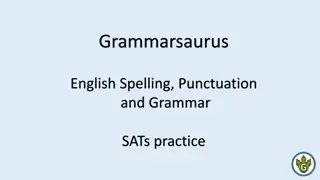Understanding Maths and English SATs 2023: Assessment Structure and Supportive Strategies for Parents
The 2023 Maths and English SATs assessment week includes tests on grammar, spelling, comprehension, arithmetic, and reasoning. Children receive scaled scores between 80 to 120, with 100 as average. The assessment format has shifted to norm-referenced measurement. SPAG tests cover grammar, punctuation, and spelling, while reading comprehension involves various question types based on texts provided. In maths, there are three papers focusing on arithmetic, mathematical fluency, problem-solving, and reasoning. Parental support is crucial in preparing children for these assessments.
Download Presentation

Please find below an Image/Link to download the presentation.
The content on the website is provided AS IS for your information and personal use only. It may not be sold, licensed, or shared on other websites without obtaining consent from the author. Download presentation by click this link. If you encounter any issues during the download, it is possible that the publisher has removed the file from their server.
E N D
Presentation Transcript
Maths and English SATs 2023 The structure of the assessment and how you can help your child.
The Assessment Assessment week is the week beginning the 8thMay 2023. BANK HOLIDAY MONDAY 8thMAY. Tuesday - Grammar and Spelling Tests (45 minutes plus spelling test). Wednesday Comprehension (1 hour) Thursday Arithmetic (30 minutes) and Reasoning Paper 1 (40 minutes) Friday Reasoning Paper 2 (40 minutes)
The Assessment Previously, children would take the assessments and be given a level according to the percentage of correct answers. Assessment has moved away from giving levels so the format to the tests is now measured against norms for the target population: each pupil is measured against the average performance for their age. Children will now receive a scaled score: scaled scores are between 80 to 120. 100 is seen as average. Anything below 100 is seen to be working towards; 110 and above is working at greater depth. Scaled scores are discussed with the children in school.
SPAG The grammar, punctuation and spelling test will consist of two parts: A grammar and punctuation paper requiring short answers (lasting 45 minutes) An oral spelling test of 20 words (heavily weighted) (lasting around 15 minutes). The spellings could be from the Year 3 and 4 word list, 5 and 6 word list and from the key words learnt since Year 3. The grammar and punctuation test will include two sub-types of questions: Selected response, e.g. Identify the adjectives in the sentence below Constructed response, e.g. Correct/complete/rewrite the sentence below, or, The sentence below has an apostrophe missing. Explain why it needs an apostrophe.
Reading comprehension Consists of 2 areas: Reading One 800-word text and two passages of 300 words. Your child will have one hour, including reading time, to complete the test. Selection of question types, including: Ranking/ordering, e.g. Number the events below to show the order in which they happen in the story Labelling, e.g. Label the text to show the title of the story Find and copy, e.g. Find and copy one word that suggests what the weather is like in the story Retrieval questions, e.g. According to the text, what does the bear eat? Open-ended response, e.g. Look at the sentence that begins Once upon a time. How does the writer increase the tension throughout this paragraph? Explain fully, referring to the text in your answer.
Maths Consists of three papers : Paper 1 Arithmetic test (30 minutes) Paper 1 will consist of fixed response questions, where children have to give the correct answer to calculations, including long multiplication and division (2 marks each). Children are currently completing an arithmetic paper each week in class so they become familiar with the types of questions that will be asked on the day. Paper 2 (non calculator 40 minutes) Paper 3 (non calculator 40 minutes) Papers 2 and 3: mathematical fluency, solving problems and reasoning with a variety of styled questioning e.g. multiple choice, true of false, giving answers to calculations , drawing shapes, completing tables and explaining approach to solving problems.
Handwriting and presentation Many of the SATs papers are scanned and marked online. Therefore, it is of upmost importance that the children think carefully about their handwriting and presentation and form their numbers accurately. If a word cannot be read, it will be marked incorrect. Likewise if a number is not formed accurately/legibly in a maths paper, the answer could also be marked wrong. The examples below show number formation that would lead to the answer being marked incorrect. Incorrectly formed 9 Unclear whether a 3 or 5.
Common mistakes Following on from practice SATs week, these common errors have been found and discussed with the children. Grammar: Not putting full stops at the end of a sentence. Not using capital letters. Not ticking the correct number of boxes. Copying a spelling inaccurately. Reading: Not ticking the correct number of boxes. Copying a phrase when it asks for a word. Repeating the words in the question to form the answers. Maths: Not putting the answer in the box. Correct workings out but then putting the wrong answer in the box. Adding when they should subtract and vice versa. These are all simple mistakes that can be rectified before May.
How you can help your child: Work through the revision books as part of home learning. Focus on revising elements that have already been covered in class. Complete Times Table Rockstars regularly. Practise the weekly spellings. Ask your child to explain their thinking and reasoning. Complete home learning tasks in as much depth as possible. Complete sample / past questions (sats.org) Check any home learning for the common mistakes detailed on the previous slide.
What happens between now and May? Each child has received revision books (Maths, Spelling, Punctuation and Grammar). Mental maths practice (times table tests, fluency tasks and weekly arithmetic test). Previous past questions are already being used in lessons. Past assessments in test conditions (Jan 2023). The results are then used to tailor interventions. Maths and Grammar breakfast club (invite only). Easter revision pack.
